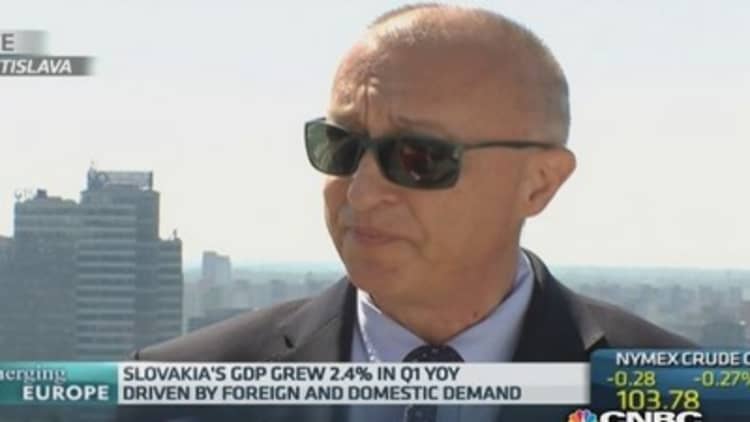Investors interested in emerging Europe might consider small-but-vibrant Slovakia, the first ex-Soviet satellite state to join the euro zone.
Its economy is one of the fastest-growing in Europe, combining a highly educated, comparatively low-cost workforce with expertise in automobile production, electronics and information and communication technology. It posted economic growth of 2.0 percent in the first quarter of 2014 on the same period a year before, well above the euro zone average of 0.9 percent.
"Slovakia is high-beta Germany," said Tomas Martinec, the director of boutique asset management firm Metatron Capital, referencing stocks that are volatile—but potentially have high returns.
Germany is the biggest markets for Slovak exports, which consist largely of cars and vehicle parts and bodies. PSA Peugeot Citroën, Volkswagen and Kia Motors all have major plants in Slovakia.
Read MoreWhy a weaker Germany could hit eastern Europe
"We reshaped the economy from the production of weapons in the 1990s… and now we are producing cars," Peter Kažimír, the deputy prime minister and finance minister of Slovakia, told CNBC in the capital city of Bratislava.
The downside of the economic restructuring is high unemployment, which remained at 13.9 percent in May, while youth unemployment rose marginally to 32.4 percent.
"The government needs to support economic growth, because we need to see a certain level of growth in order to decrease unemployment," said Jozef Síkela, the CEO of Slovenská sporiteľňa, Slovakia's largest commercial bank.
"But there area lot of regulatory issues, which should be smoothened to be easier for investors."
In the meantime, a punt on Slovak stocks may be off the cards for investors, as only five companies are listed on the Bratislava Stock Exchange.
"We don't invest in eastern Europe because markets are so small and illiquid," said Martinec, whose firm has bases in both Slovakia and the Czech Republic.
He blamed the desultory state of the Slovak stock market on the hurried privatizations that followed the fall of the Berlin Wall in 1989. Local aspiring capitalists were quick to take advantage of the confusion that followed, trying to turn a fast profit from buying formerly state-owned companies for as little as one kurona (Slovakia's pre-euro currency).
Read MoreUkraine 'highest risk' for Slovakia: Deputy PM
"The market (today) doesn't exist because of the trust issue," Martinec told CNBC in Bratislava. "In the rush of privatizations of 1993 and 1994… law enforcement was not in place, so there was room for plenty of people to make a quick buck. Even after that, there have been people offering 10, 12 or 15 percent returns that were clearly not realistic and people have been burnt."
Despite the lack of publicly listed companies, domestic investors are nonetheless putting their money to play, according to Martinec. Areas of interest include high-tech, hospitality and alternative energy.

"The market is vibrant here, but not in the public arena," he said. "There is plenty of money that is local… and the people who have money want returns."
For outside investors, one deterrent might be any worsening in the conflict in Slovakia's next-door-neigbor Ukraine. Slovakia is almost entirely dependent on imported gas, of which 83.5 percent comes from Russia, mostly via Ukraine.
"This is the highest risk that you can feel now," said Deputy Prime Minister Kažimír. "For us, as a country which is fully dependent on Russia—I'm talking about oil reserves and gas flow—this is very important for us."
Slovakia's high exposure to Germany could also bode ill, as recent business surveys and industrial production data suggest Europe's biggest economy is slowing down.
"Our economy is very much connected to the German economy; there is no secret about that," the head of the Slovak Investment and Trade Development Agency , Robert Simoncic, told CNBC. He said Slovakia needed to increase its exports to high-growth markets like Russia, Turkey and South East Asia.
However, Simoncic was adamant Slovakia should retain close ties to Western Europe, and was positive about using the euro, despite joining the single currency just as the euro zone debt crisis erupted in 2009.
"I think the big hurdle we crossed was joining the euro, because with that, we have a stable currency. With that, a lot of foreign investment came in; it was much lower risk for foreign investors," he said.
"Slovakia is one of very few countries in central and eastern Europe with the euro and that is a great positive value we brought in."
—By CNBC's Katy Barnato in Bratislava, Slovakia
UPDATE: This story has been updated to clarify that Slovakia (or Czechoslovakia as it was) is an ex-Soviet satellite state.




